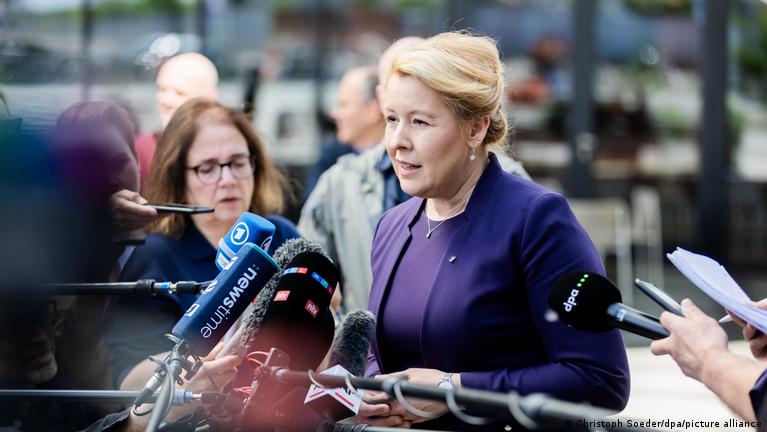
Photo Credit: Getty Images
In a quiet corner of a Berlin library, the tranquility was shattered by an unexpected act of violence. Franziska Giffey, a former mayor of the German capital and currently serving as a senator, found herself at the center of a disturbing incident. As she browsed the bookshelves, a man struck her from behind, aiming blows at her head and neck.
The Attack
The assault on Giffey was swift and brutal. The assailant wielded a heavy object concealed within a bag, using it to strike the unsuspecting politician. Giffey, a member of the Social Democrats (SPD) and responsible for economic affairs in Berlin, staggered under the impact. Bloodied and disoriented, she was rushed to the hospital for medical attention.
Growing Concerns
This incident is not an isolated one. Across Germany, there has been a disturbing trend of violence targeting politicians. Franziska Giffey’s attack adds to the growing list of such incidents. Just days before, Matthias Ecke, a European parliament member from the SPD, suffered a violent assault while putting up campaign posters in Dresden. The attackers left him battered and hospitalized, raising questions about the safety of those in public service.
Political Violence on the Rise
As the country prepares for upcoming elections, concerns about political violence are mounting. The motivations behind these attacks remain murky. Are they driven by personal vendettas, ideological fervor, or mere opportunism? Regardless, the impact is felt not only by the victims but also by the democratic process itself. When politicians become targets, it undermines the very fabric of a functioning society.
Calls for Transparency and Security Measures
In the wake of Giffey’s assault, there are renewed calls for transparency. Should politicians be more forthcoming about their security arrangements? Should voters have access to detailed health records and risk assessments for those seeking public office? These questions resonate as citizens grapple with the delicate balance between privacy and accountability.
Conclusion
Franziska Giffey’s harrowing experience serves as a stark reminder that public service comes with risks. As investigations continue into the library attack, Germany faces a critical moment. How it responds—whether by bolstering security measures, promoting dialogue, or addressing underlying societal tensions—will shape the future of its democracy.
















